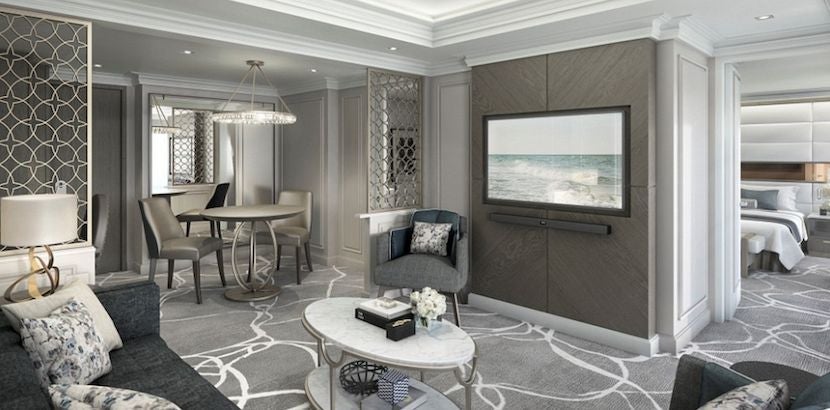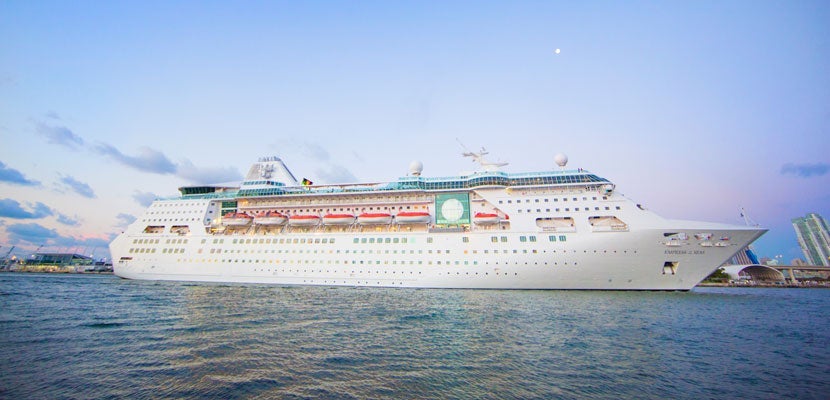FYI: Residential Cruise Ships Are a Thing
Most of us seem to know one or two people who spend what seems like half their lives aboard a cruise ship. Every time you turn around, they're just getting back from an Antarctic adventure, are talking excitedly about their upcoming cruise of the Mediterranean or are posting black tie-clad selfies from a captain's dinner several miles out to sea. These veteran cruisers (sometimes called "frequent floaters") practically seem to live on the water — and now they really can.
In the past year, a handful of cruise lines have realized that there's a market of hungry homebuyers who would happily pay to own a cruise ship cabin, and the cruise lines are abiding.
The idea, as a business, dates back to 2002, when The World and its 165 residences at sea set sail and never looked back. Like any commercial cruise ship, this luxury ocean liner is packed with amenities, including restaurants, bars, a movie theater, a spa and wellness center and an ever-changing list of ports of call. This year, the ship started out in Antarctica, then moved up the east coast of South America before heading across the Atlantic to the Canary Islands and Casablanca; residents will spend the next few months touring Europe, the Middle East, India, the Maldives, Malaysia and expect to be ringing in the New Year in Sydney. The residences, which all come with private verandas or balconies, range from studios to three-bedroom cabins. Prices reportedly range from between $825,000 and $7.3 million (though you've got to prove that your net worth is at least $5 million if you want to join this club).
The World then got some competition with the announcement of Utopia, another residential cruise ship designed to be twice the size of The World. It's also different from The World in that, in addition to its 190 residences, the ship will feature a 206-room boutique hotel for guests who would prefer to spend the bulk of their year on dry land. Though its official launch date has been adjusted a few times, Utopia has been selling its homes — which will cost cruisers anywhere between $3.9 to $30 million — since 2013, with the latest reports claiming the ship will be ready later this year.
Cruise ship living spawned two more competitors last year, with The Marquette, which will keep water-based living closer to home as the ship sticks to traversing 5,500 miles worth of American rivers and 1,100 miles of Intracoastal Waterway. Cabins will range between 528 and 924 square feet, and ownership options will include half, full or two-month tiers (with prices topping out at $499,000 for full ownership of the largest cabin plus $2,040 monthly in HOA fees).

Not to be outdone, Crystal Cruises announced last summer that it, too, would be offering opportunities for onboard ownership on three of its new polar class cruise ships, with the top deck of each ship reserved for full-time cruisers (48 residences apiece), who will have access to their own private restaurant as well as other facilities — plus all the first-class amenities that their temporary brethren receive, like Michelin-starred dining options. The new ships are estimated to set sail in 2018.

While all of this may seem like a new travel trend, try telling that to Mario Salcedo, a.k.a. "Super Mario," a 66-year-old investment manager who has spent the past 20 years living aboard a variety of commercial cruise ships and who currently calls Royal Caribbean's Empress of the Seas home (he has stayed on 23 of the cruise line's 25 ships). While he doesn't officially own a cabin, he books his individual trips early enough to keep the same one, which is an interior stateroom. "I don't do anything in my cabin other than shower, get dressed and sleep," Salcedo, who spends about $65,000 a year to stay afloat, told Condé Nast Traveler.
So, what's it like to spend all your time on a cruise ship? Salcedo says it's pretty similar to The Love Boat. "Watch the reruns," he told mental_floss. "Everybody's happy. Everyone's defenses are down. Everyone wants to have a good time and socialize." Salcedo also believes that it's been good for his health. "I've never been sick a single day. Never had norovirus, none of it. I eat smart, exercise and I have no stress. Zero stress!" That sounds like a lifestyle we can get on board with.
How does this sound to you? Would you want to spend your life at sea?
TPG featured card
at Capital One's secure site
Terms & restrictions apply. See rates & fees.
| 5X miles | Earn 5X miles on hotels, vacation rentals and rental cars booked through Capital One Travel |
| 2X miles | Earn unlimited 2X miles on every purchase, every day |
Pros
- Stellar welcome offer of 75,000 miles after spending $4,000 on purchases in the first three months from account opening. Plus, a $250 Capital One Travel credit to use in your first cardholder year upon account opening.
- You'll earn 2 miles per dollar on every purchase, which means you won't have to worry about memorizing bonus categories
- Rewards are versatile and can be redeemed for a statement credit or transferred to Capital One’s transfer partners
Cons
- Highest bonus-earning categories only on travel booked via Capital One Travel
- LIMITED-TIME OFFER: Enjoy $250 to use on Capital One Travel in your first cardholder year, plus earn 75,000 bonus miles once you spend $4,000 on purchases within the first 3 months from account opening - that’s equal to $1,000 in travel
- Earn unlimited 2X miles on every purchase, every day
- Earn 5X miles on hotels, vacation rentals and rental cars booked through Capital One Travel
- Miles won't expire for the life of the account and there's no limit to how many you can earn
- Receive up to a $120 credit for Global Entry or TSA PreCheck®
- Use your miles to get reimbursed for any travel purchase—or redeem by booking a trip through Capital One Travel
- Enjoy a $50 experience credit and other premium benefits with every hotel and vacation rental booked from the Lifestyle Collection
- Transfer your miles to your choice of 15+ travel loyalty programs
- Top rated mobile app

